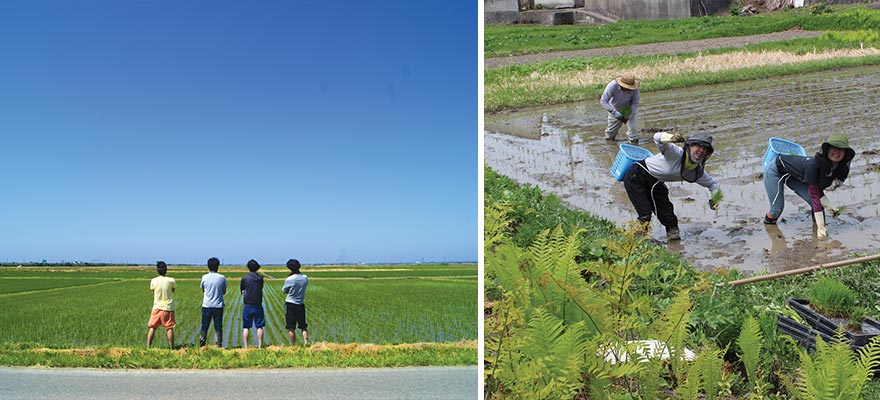Home > Highlighting JAPAN >Highlighting Japan June 2014>Revitalizing Japan's Regions
Highlighting JAPAN
Revitalizing Japan's Regions
The Syougakumai Project
A new way to connect Japan's farm villages and urban residents

The goal of the Syougakumai Project is to use rice to connect urban youth with farm villages and bring the wonders of agriculture to a wide audience. As implied by the project's name—which means "scholarship rice"—university "rice scholars" receive rice instead of scholarship funds in exchange for helping farm families.
Keisuke Kasagi, then a university student in Tokyo, started the project in 2009 from a simple idea. "I want to make better use of the crops," Kasagi says. "I'd like to close the gap just a little bit between farmers and consumers, and get more people—even if it's just one more—involved in agriculture."
The Syougakumai Project began in Tomioka, Fukushima Prefecture, and has now spread to Niigata City and the Fukushima town of Tadami. The students involved have various motives for participating: some are simply in it for the rice, others are hoping to become nutritionists, and still others are seeking employment with firms that deal in farm equipment. There have been over three hundred participants so far. Three times a year—primarily on weekends—the students go to farms and help out with farm work. In return, they each receive thirty kilograms of rice. In the typical farm experience, participants usually help out only with the more enjoyable aspects, such as planting and harvesting the rice. The Syougakumai Project, however, focuses on a more realistic farm experience that includes more rigorous manual labor.
Farmers don't usually come into contact with urban college students, so they find the opportunity to interact with them an invigorating experience that instills them with a greater will to work. As one farmer states, "Our town's population continues to decline, so it's a very happy event to have young people come. They're also the future of consumption, making their impressions and opinions very valuable to us producers." Some of the youths even continue to visit the farmers they befriended through the Syougakumai Project on their own once they become working adults. The bonds created between these farm families and young people could last a lifetime.
Beyond just being able to obtain rice, students gain emotional benefits from participating in the program. "I had so many experiences, like entering the rice paddies barefoot, picking the weeds, feeding the chickens and participating in local events," explains Kazuki Matsumoto, who has joined in the Syougakumai Project for four years running. "For those of us raised in an environment where we can simply pay money and eat anything we want, earning rice with our own sweat is a deeply moving experience. By participating in this project, my attitude toward and awareness of food changed." Matsumoto says he looks forward to the day he can use his own money to buy the rice grown by the farmers he has helped.
The Syougakumai Project is expanding into a "global syougakumai" focused on foreign exchange students. Exchange students frequently choose schools in urban areas, so working and experiencing daily life in the countryside enables them to gain a precious taste of grassroots Japan. With exchange students photographing the rural Japanese countryside and uploading their pictures to social networks, as well as telling their friends back home about their lives with farm families, the program will show the world a side of Japan different from its urban landscape, and the relationships forged here will give students reasons to come back to Japan again.
"To be honest, this project isn't just a revitalization of rural communities," says Kasagi. "I feel that it might be better cast as an activity designed to lift the spirits of city people through the countryside. It'd be nice if we could increase the number of fans of Japanese agriculture throughout the country—and throughout the world!" The power of young people will invigorate local farming and help pass the baton to the future. There are high hopes for this new form of communication.
© 2009 Cabinet Office, Government of Japan






